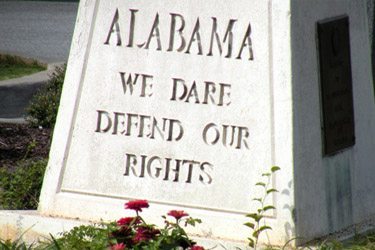Alabama Lawmakers Fast-Track Bill to Shut Down Clinics While Yawning Through Testimony
Limiting bill opponents time to testify, proposing bills in the dead of the night, the Alabama legislature is making closing clinics a priority despite the voters' wishes.

In just the first few hours of the Alabama 2013 legislative session, lawmakers proved themselves ready to jump straight to work on the issues they apparently feel really matter to the people of their state.
Closing all the abortion clinics.
The session began on Tuesday with a State of the State address by the governor, but no actual legislative work. Wednesday’s most pressing issue, however, was a House hearing on a Targeted Regulation of Abortion Provider (TRAP) law that could close down every clinic in the state by requiring changes to buildings that are not necessary, and a requirement that all abortions be performed only by physicians with both an Alabama state license and with admitting privileges to a local hospital.
It is the same type of bill passed in Mississippi and under which that state’s last clinic may be closed; many worry a similar bill could do the same in North Dakota, where it will be heard this week. Yet lawmakers and bill supporters in Wednesday’s hearing claimed that the bill had nothing to do with trying to shut down providers at all, and instead argued it was necessary to stop Alabama from becoming a haven of “abortion tourism.” AL.com reports that, “Supporters heralded the bill, which cites an ‘alarming level of regulatory non-compliance among abortion and reproductive health centers,’ as a means to improve women’s health.”
If “abortion tourism” does somehow exist in the state, said bill opponent Tori Smith, it is a result not of allegedly lax standards in clinics, but because women in nearby states lack access to clinics providing safe abortion care. “Of course you are going to see women with Mississippi plates in Tuscaloosa. For many of them the clinic is 40 minutes away and the one in Jackson is four hours.”
Smith, who is a clinic employee at a provider in Alabama, was one of 15 witnesses to testify against the bill in a short House Health committee hearing. According to Smith, the hearing leaders decided that in order to provide “equal time” for both those who supported and those who opposed the measure, the 15 who opposed the bill were allowed roughly 90 seconds of testimony compared to the four to five minutes allowed for each supporter of the anti-choice legislation.
Many opponents offered their time up so others could have more, but the lengthened testimony seemed to have little impact on the committee itself, which treated the two sides very differently according to Smith. “The supporters of the bill were thanked for their time, treated very politely. During our testimony members talked, stretched and scratched their heads and made other impatient gestures or yawned openly and loudly. It was very disrespectful.”
If the committee hearing was inclined to be more accommodating for the anti-choice witnesses, it probably wasn’t due to their medical expertise. Of the five witnesses to testify in support of HB 57, not one provides reproductive health care in any form to women. This includes Sue Turner, the director of Alabama Physicians for Life, who, herself, isn’t actually a physician. In fact, only one physician who served on the board of an ambulatory care center and who provides endoscopes, had medical credentials at all.
HB 57 passed committee via voice vote and is expected to get a full House vote either Thursday or Friday of this week. A concurrent Senate bill, SB 103, was introduced in the early hours of the morning prior to the House committee meeting, and will likely move just as quickly.
Having an immediate committee vote after testimony, and seeing both bodies move the bill so fast, is an unusual occurrence in the legislature, especially when it’s focused on a bill that only the legislature—and not the voters in Alabama—are actually interested in.
“In an exit poll in 2012, 61 percent of Alabama voters said they wanted the legislature to focus on creating jobs,” said Nikema Williams, Vice President of Public Policy for Planned Parenthood Southeast. “Then the first thing that they do as soon as they get into session is try to force this backdoor abortion ban through. This didn’t just come up by happenstance for a public hearing on the second day of session and the first day of committee meetings and a vote on the same day. This is trying to be railroaded through.”
Unfortunately, should the bill pass both chambers, it’s pretty much a guarantee that it will be signed into law by Governor Robert Bentley, who during his time as a Representative in the House was considered one of the most solidly anti-choice votes in the body. Once it is signed into law, there is little question that a legal challenge will be far behind.
